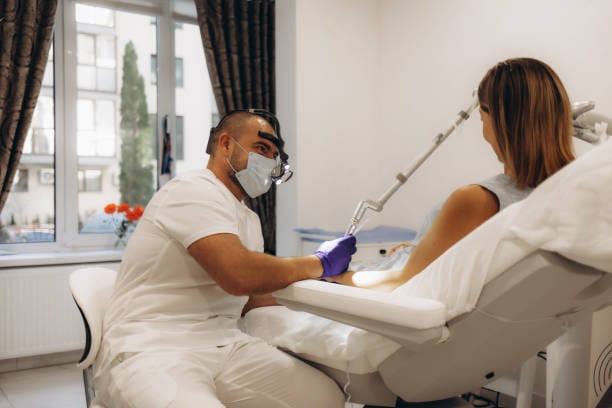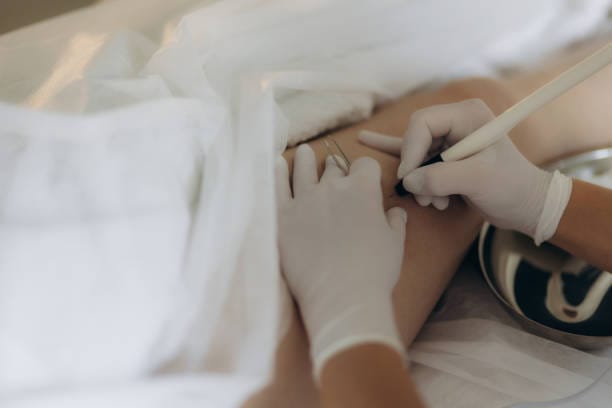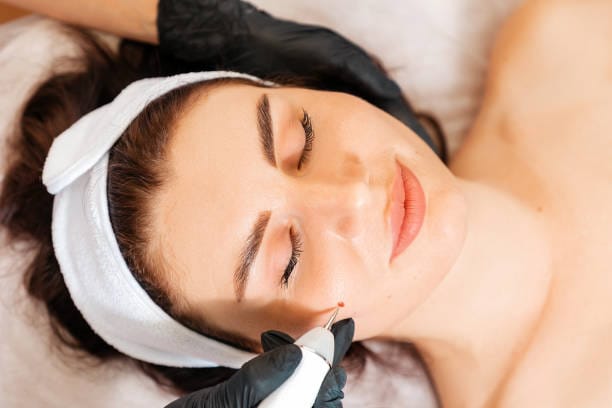Verruca Treatment Near Me: Finding the Best Clinics | Revitalise London

Verrucas are quite common skin growths that can be uncomfortable and even embarrassing. Human papillomavirus (HPV) causes these small, rough warts, which usually appear on the feet. Some verrucas disappear independently, while others persist, are painful, and even spread to other body areas. If you are looking for a reliable solution to remove and prevent repeated verrucas on your plantar area, look for a verruca treatment near me.
The best way to achieve this is through professional treatment from a reputable clinic. There are many treatment options, such as cryotherapy and laser treatment, so the key to getting quick and lasting results is finding a clinic with the latest technology and experienced specialists. This guide will help you understand your treatment options and arrange a nearby clinic.
Understanding the causes of verrucas and the importance of the professional treatment a skilled person offers will better prepare you to make an informed decision on what procedures you can expect. Whether you already have a painful verruca or want to avoid having one, professional treatment is how to maintain healthy, wart-free skin.
What Is a Verruca? & How To Find Best Verruca Treatment Near Me
A verruca is a small growth on the skin caused by a virus, frequently located on the soles of the feet. Human papillomavirus (HPV) causes these warts when it gets into the skin through small cuts or abrasions. Verruca is contagious and can spread through contact with the skin and shared surfaces infected with the virus like public swimming pools, showers, or gym floors
A verruca can look different but is usually raised, with rough-looking bumps and a hard-peeled surface. On top of the wart, they may have tiny black dots that are blood vessels that feed the wart. Verrucas will usually grow in areas of the foot where weight bears, such as the back of the heel or the ball of the foot, and can be painful when walking or standing.
Although verruca are usually harmless and often disappear independently, they are very uncomfortable and can spread to other body parts and people. They may also get larger or reproduce, especially if not treated.
If you have a verruca and the wart does not go away on its own, or it starts to become painful or does not spread, you need to treat it. You can receive professional treatment in a trusted clinic, which can help you guarantee complete removal and avoid further problems and much less likely recurrence.
Why Professional Verruca Treatment Is Important
Over-the-counter treatments for verruca may seem tempting, but professional removal is usually the most effective and easiest way to do it. Both clinics specialising in offering medical-grade skincare or podiatry do much more than the at-home treatments and offer better-targeted solutions. If you have any verruca, you should seek professional verruca treatment for the reasons below.
1. Faster and More Effective Results
Over-the-counter treatments are popular, while professional treatments like cryotherapy, laser therapy, and electrosurgery are much more preferred. These methods directly target the verruca, leading to faster and more thorough removal. An OTC option usually takes several weeks or even months and rarely completely removes a wart, which means it can return.
2. Safe, Proven Techniques
With proven techniques and treatments that are also safe and effective, you can find that the verruca treatments with professionals performing them are worth the cost. For instance, wet or dry packing is commonly used in clinics with cryotherapy, and it is very effective for warts. Laser therapy is similar in destroying the wart tissue but not harming the surrounding skin. These treatments score them or promote blood flow to the skin to reduce the likelihood of scarring and other problems from ill-advised self-treatment.
3. Prevention of Spread
When a professional removes the verruca, it will be completely gone, thus decreasing the chance of it spreading to other parts of the body and other people. In proper treatment, reinfection is much less likely. Sterile equipment is also used in clinics to decrease infection and the risk of cross-contamination.
4. Personalized Care
At a clinic, you are given personalised care. Your verruca is assessed by specialists based on its size, where it is located, how bad it is and the best treatment for your case. Aftercare instructions will also be provided so your foot heals properly and you do not develop any further problems.
Types of Verruca Treatments Available at Clinics
At the professional clinics, there are several treatment options for verrucas. The verruca is treated using each method depending on the degree of severity, the location, and the degree of persistence.

1. Cryotherapy (Freezing Treatment)
The most popular and effective treatment for verrucas is cryotherapy. In this procedure, liquid nitrogen freezes the wart, causing the tissue to die and fall off. If the infection spreads, the cells freeze and slough off as the skin heals. The number of sessions needed for cryotherapy varies, but it usually does not exceed 1−3, depending on the verruca's size and location.
The treatment itself is quick and involves only some slight discomfort at the time of the procedure. You may notice some redness or blister in the treated area after that. As the skin heals, the wart gradually falls off over time. A success rate of 60 – 80% can be achieved by cryotherapy. Despite this, it sometimes results in a small scab or blister at the treatment site, which will heal over time.
2. Laser Therapy
Laser therapy is an effective treatment for verruca that is increasing in effectiveness. This technique uses targeted laser light to vaporise the wart tissue. The laser destroys the wart’s blood supply and infects cells. Laser treatment is most useful for treating large, hard, prominent, or deeply embedded verruca.
Most patients feel only a mild warming sensation during the procedure. Because it’s so precise, laser therapy ensures that surrounding healthy tissue is not damaged. It can also provide benefits when used to treat verrucas that won’t shift under other methods. Results are sometimes seen after one session, but verrucas may take several treatments, particularly where they are large and deep.
3. Electrosurgery
Electrosurgery involves using an electrical current to burn the wart tissue, which shrinks and falls off. This treatment is useful for large verruca or refractory verruca, as well as cryotherapy or laser therapy. It is usually done under local anaesthesia, so it’s fairly painless, although there is some soreness afterwards.
Due to the speed at which electrosurgery can remove a wart, it is often done in one session, and the wart disappears. A scab may form after treatment and likely fall off as the skin heals. Electrosurgery does work, but only if done correctly can a small scar be left behind.
4. Salicylic Acid Treatment
However, a more traditional way of removing verrucas is to use salicylic acid treatment. This method applies a high concentration of salicylic acid to the wart, slowly breaking layers of infected skin. It softens the wart tissue, allowing the body the wart.
Salicylic acid home treatments are possible, but clinics use stronger concentrations. It’s not overnight, as the process usually takes weeks, during which the treatment is repeated repeatedly, but it’s highly effective when done by a specialist. The wart will become softer and peel after each session.
5. Minor Surgical Removal
A doctor can advise minor surgical removal of the verruca in rare cases where other treatments do not work. Local anaesthesia is used when cutting out the wart with a scalpel. For large verruca or warts that are resistant to other treatments, surgery is usually not offered. This method is effective but riskier to the skin and carrying infection.
How to Find the Best Verruca Treatment Near You
There is just so much to find one of the ‘right’ verruca treatments. Still, there are some things to consider, so you should choose a reputable clinic and a good treatment. The best way to go through this is to find the best clinic to deal with your verruca removal. These are some tips about how you can see the best one.
1. Check for Qualifications and Experience
When choosing a clinic, it is essential to ensure that both practitioners are properly qualified and experienced. If unsure, seek out clinics that employ dermatologists, podiatrists, or licensed medical professionals with experience treating verruca. Check for certificates, training, and reviews regarding their experience treating warts and other skin conditions.
2. Check The Clinics That Specializes In Treatments.
All clinics do not treat verrucas in the same way. For example, if you’re seeking procedures such as laser treatment or cryotherapy, it’s best to confirm that the clinic is practising them. In cases where a verruca is stubborn or deeply rooted, these specialised treatments will hopefully give better results. Find out what specific treatments the clinic offers and whether they use the latest technologies and techniques for verruca removal.
3. Consider the Location and Accessibility
When looking for a verruca treatment clinic, convenience is a must. Choose a nearby clinic, as this will reduce the need for multiple visits. Most clinics offer flexible appointment times, such as weekends and evenings, so it doesn’t matter if you are too busy during the work week.
4. Read Reviews and Testimonials
When reading reviews from previous patients, one of the best ways to find a trusted clinic is to do so. Search for reviews on the clinic’s website, third-party review sites, or social media platforms. There are several other things to review, such as the clinic's level of care, customer service and overall patient satisfaction.
5. Price And Treatment Plans
However, cost shouldn’t be the only deciding factor, and you should ask about the price of different forms of treatment. We explain that reputable clinics should provide transparent pricing, and you may be given the freedom of consultation services to discuss the suitable treatment plan for your verrucae with someone.
What to Expect During Verruca Treatment
Knowing what to expect with verruca treatment makes you more comfortable and ready. Whether you choose cryotherapy, laser treatment, or electrosurgery, each has its steps and considerations. The professional verruca treatment at the clinic includes:

1. Consultation and Assessment
A consultation is the first step in any treatment process. During this appointment, a relationship can be formed by examining the verruca with a healthcare professional to discuss the best treatment option for your case. That consultation is the chance to ask questions about it and to clear any fears you have about the procedure. They will also review your medical history to check for the safety and appropriateness of the treatment for you.
2. Pre-Treatment Preparation
In preparation for treatment, the area around the verruca will be cleaned so the practitioner can perform the procedure in a sterile environment. You may have to remove footwear or socks, as you will receive cryotherapy or laser treatment directly. Local anaesthesia may numb the area to prevent discomfort during electrosurgery or salicylic acid application.
3. The Treatment Procedure
Each step or process is different for treating them:
Freezing treatment: The verruca is frozen for a few seconds using liquid nitrogen cryotherapy. Going through applying cold liquid nitrogen, you may feel a cold sensation and mild discomfort. Usually, the blister formed after treatment will heal within a few days.
Laser Therapy: The practitioner uses a laser during the verruca treatment. You should feel slight warmth or tingling as the laser is applied to the wart tissue. This method is quick and painless, some describe no discomfort, and most patients tolerate it well.
Local anaesthesia: If your electrosurgery requires local anaesthesia, the area will be numbed before the electrical current is used. As the wart tissue is removed, you might feel a slight burning. This is often a one-session treatment, but a follow-up appointment may be needed if the wart isn't gone.
Salicylic Acid: If the person uses salicylic acid, the practitioner will slowly apply it to the affected verruca, seeping apart the wart tissue with time. The process is usually painless; however, some may feel mild irritation or stinging.
4. Aftercare and Recovery
The clinic will give you some aftercare instructions after your treatment. The treatment dictates keeping the area clean and avoiding excessive pressure or moisture. The area may scab when undergoing treatments, such as cryotherapy or electrosurgery, and you should not pick at it, which will allow proper healing. Most treatments don’t require you to spend days lying around, and you may return to your normal activities within a few days.
Aftercare Tips for Verruca Treatment Recovery
It is important to have proper aftercare of the verruca to avoid an immediate return. Most verruca treatments can be done with minimal downtime and the correct aftercare steps; however, adhering to the right ones should extend the healing time and minimise complications. The type of treatment you had will determine what your aftercare tips can be learned from:
1. Keep the Treated Area Clean
Once treated, the area must be kept clean to avoid infection. In this regard, wash the affected area with mild soap and water without harsh chemicals or scrubbing the skin. Scabs or blisters themselves occur naturally and should not be peeled. If these occur, let them heal naturally; don't peel off at them because it will cause the healing to slow down.
2. Protect the Area from Moisture
The area should stay dry for at least 24 hours after treatments such as cryotherapy and electrosurgery. Blisters should not be soaked in water for long, such as in baths or swimming pools. Moisturizing the area with a recommended ointment can soothe the skin for laser treatments.
3. Avoid Excess Pressure and Friction
Verrucas normally appear on the feet, so massages should be removed from the treated area. The footwear should be comfortable, breathable shoes and avoid tight footwear around the skin. A soft bandage or padding can protect the area while it heals.
4. Watch for Signs of Infection
Complications are rare but need to be watched for signs of an infection in the treated area, including:
- Increased redness or swelling
- Discharge of pus or pus from the site
- Persistent pain or warmth in the area
If you are experiencing any of these symptoms, speak with your clinic; these should be checked by appointment.
5. Follow Up If Needed
Other treatments, such as cryotherapy or laser therapy, might take several treatments to remove the verruca completely. Sometimes, you will have one or more follow-up appointments; follow your specialist’s recommendations. Your clinic may also suggest an alternative treatment if the verruca does not improve or return.
6. Prevent Verruca Recurrence
Prevention includes good foot hygiene to keep feet clean and dry, not sharing footwear in places such as pools and showers, and limiting contact with other people’s warts. Eating a healthy diet and living a healthy lifestyle may also help the body resist viral infections that cause verruca.
Why Choose Revitalise London for Verruca Treatment?
Revitalise London is dedicated to providing safe, effective, professional verruca treatment suited to your needs. We offer a range of advanced treatment options, such as cryotherapy, laser therapy, and electrosurgery, to ensure we can reach those verrucas where the term ‘stubborn’ truly begins to apply! Whether your verruca is small or large, our specialists will evaluate it and suggest the best therapy.
Hygiene, cutting-edge technology, and an expert medical team, all of whom will ensure you are given the best care possible, are things we pride ourselves on. We offer quick, minimally invasive procedures with the goal of long-lasting results and removing your pain of regaining clear, healthy skin.
At Revitalise London, our patients are foremost. First, we schedule appointments flexibly, have a welcoming clinic environment, and can give personalised advice aftercare, which helps make a recovery as smooth as possible. With our excellent experience, our professionals will help you through every stage, from consultation to care after the treatment.Currently, if you are searching for “verruca treatment near me”, you don’t need to look further than Revitalise London. Contact us today to book a consultation and avoid painful, awful verruca by letting our trusted, expert-led treatments get rid of verruca safely and with one of our cavities.
